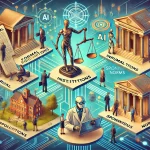
The Synergy of AI and Precision Medicine in Personalized Treatment
December 20, 2024Introduction
Healthcare is entering a transformative era fueled by the convergence of Artificial Intelligence (AI) and Precision Medicine. Together, these fields promise to move beyond the traditional one-size-fits-all approach to a personalized, effective, and proactive model of care. This blog explores how AI and precision medicine are revolutionizing the healthcare landscape, the challenges they face, and the opportunities they offer for a healthier future.
Understanding Precision Medicine
Precision medicine focuses on tailoring medical treatments to the unique characteristics of each patient by analyzing:
- Genomics: The genetic makeup of individuals to predict disease risks and treatment responses.
- Lifestyle and Environment: Factors such as diet, access to care, and environment that significantly impact health outcomes.
- Medical History: Clinical data and past health records to enhance care strategies.
By integrating these factors, healthcare providers can create a complete health profile for better diagnoses and treatment plans.
AI: The Engine Driving Precision Medicine
AI complements precision medicine by processing vast datasets and uncovering actionable insights. Its capabilities include:
- Analyzing Big Data: Interpreting genomic data, medical records, and lifestyle information.
- Pattern Recognition: Leveraging machine learning to predict disease risks and treatment outcomes.
- Augmenting Expertise: Enhancing clinicians’ decision-making with sophisticated data analysis, not replacing human expertise but empowering it.
Applications of AI in Precision Medicine
AI-powered precision medicine is already transforming various aspects of healthcare:
- Cancer Treatment: AI analyzes genomic and imaging data to predict biopsy malignancy and guide radiotherapy decisions.
- Genomic-Guided Therapy: Real-time genome interpretation helps clinicians recommend personalized medications and dosages.
- Risk Prediction: AI assesses data to predict risks of conditions like heart failure and organ dysfunction.
- Disease Detection: Image analysis and wearable devices facilitate early diagnosis of diseases like diabetic retinopathy and cervical cancer.
- Fraud Prevention: AI detects coding errors and fraud in healthcare systems, saving millions of dollars.
The Five Pillars of AI-Driven Healthcare
AI and precision medicine influence the healthcare spectrum in five significant ways:
- Payers: AI tools mitigate fraud and manage costs efficiently.
- Providers: Clinical decision support and predictive tools enhance patient care.
- Policymakers: Data-driven insights aid in resource allocation and outbreak management.
- Patients: Personalized treatments and early disease detection improve outcomes.
- Product Manufacturers: AI accelerates drug discovery and development.
The Challenges Ahead
Despite its promise, integrating AI and precision medicine into real-world healthcare faces hurdles:
- Data Bias: Inadequately trained AI models risk amplifying existing biases in health data.
- Real-World Validation: Ensuring AI systems perform consistently in clinical environments.
- Data Privacy and Security: Safeguarding sensitive health data is essential for public trust.
- Implementation Barriers: Standardizing data formats and meeting regulatory and privacy standards is challenging.
Future Directions
The convergence of AI and precision medicine envisions a future of proactive and highly personalized healthcare:
- Genomic Insights: AI-driven genome interpretation allows precise therapy recommendations.
- Environmental Factors: AI integrates social determinants like housing and access to care into treatment planning.
- Clinical Support: AI predicts patient needs, such as ventilation requirements, to optimize care.
- Consumer Technology: AI-powered tools help individuals understand risks and encourage behavioral changes.
Conclusion
The combination of AI and precision medicine offers an unprecedented opportunity to revolutionize healthcare. By addressing challenges such as bias, data security, and real-world implementation, the healthcare industry can fully harness these technologies. Together, they pave the way for more accurate diagnoses, effective treatments, and improved patient outcomes. The future of healthcare lies in embracing this personalized, data-driven approach, ensuring a healthier tomorrow for all.
FAQ: Precision Medicine and AI in Healthcare
1. What is the core concept behind precision medicine, and how does it differ from traditional healthcare approaches?
Precision medicine aims to personalize healthcare by tailoring treatments and preventive measures to the unique characteristics of each individual. This approach moves away from the traditional, one-size-fits-all method of treating the “average patient” and considers individual factors, including genetic makeup, lifestyle, environment, and medical history, to determine the best care plan. Unlike traditional healthcare, precision medicine seeks to understand the underlying molecular and environmental factors driving a disease, enabling more targeted and effective interventions.
2. How is Artificial Intelligence (AI) being applied in the context of healthcare and precision medicine?
AI is being used in healthcare to analyze large and complex datasets, including genomic information, medical images, and patient records, to identify patterns and insights that might not be apparent to humans. This can help with a range of applications, including improving diagnostic accuracy, personalizing treatments, predicting patient risks, and assisting in clinical decision-making. AI algorithms can also process data from wearable devices and home monitoring systems, creating a more comprehensive picture of a patient’s health status. In essence, AI serves as a tool for “augmented intelligence,” supporting healthcare professionals, rather than replacing them.
3. What are the “5 V’s” of big data, and how do they relate to healthcare applications?
The 5 V’s of big data are:
- Volume: The sheer amount of complex, heterogeneous data is too large for traditional databases.
- Velocity: The speed at which new data is generated and moves through systems.
- Variety: The different types of data, including structured (e.g., databases), semi-structured (e.g., XML), and unstructured (e.g., text, images).
- Veracity: The certainty, accuracy, relevance, and predictive value of data.
- Value: The ability to convert data into actionable insights. In healthcare, these characteristics illustrate how big data analysis using AI is crucial to extract useful information from diverse sources and provide better patient care.
4. How do “genomic considerations” influence therapy planning within precision medicine, and what role does AI play in this?
Genomic considerations are a core element of precision medicine because they allow healthcare professionals to understand how a patient’s genetic makeup may influence their response to certain treatments or risk for disease. AI plays a critical role in interpreting complex genomic data, identifying variants that affect drug metabolism or response, and predicting which patients are most likely to benefit from a specific treatment. This includes identifying pharmacogenomic variations that affect a patient’s response to medication, enabling clinicians to prescribe the correct drug and dose for individuals, and it is done in a high-throughput, more efficient, manner. AI is key to making personalized treatment plans using genomic information a reality.
5. Besides genetics, what other types of data are important for personalizing healthcare, and how are they integrated using AI?
Beyond genomics, a patient’s lifestyle, environment, social determinants of health, and medical history are also important factors for personalized healthcare. These nongenomic considerations can account for a significant portion of a person’s health determinants. AI is essential to integrate these diverse types of data from sources such as wearable devices, patient health records, and even location data. AI can analyze complex interplays between these factors and determine the risk factors and most suitable therapies for an individual. This provides a more holistic view of an individual’s health that a doctor would not be able to achieve manually.
6. What are some practical examples of how AI is being used in various medical fields, like imaging or monitoring?
AI is used in various medical fields for several practical applications, including:
- Medical Imaging: Analyzing medical images to detect diseases, such as breast cancer, more quickly and accurately by identifying subtle patterns difficult for humans to detect. It is being used for applications such as radiogenomics, the study of the relationship between images and the patient’s genetic information.
- Remote Monitoring: Analyzing data from wearable devices to track biomarkers and detect health changes earlier for conditions such as diabetes, heart failure, and neurological conditions, enabling real-time monitoring and personalized management.
- Clinical Decision Support: Providing clinical decision support to aid physicians in diagnosing complex conditions and planning personalized treatment strategies by integrating a patient’s unique circumstances with up-to-date medical knowledge.
7. What are some ethical and practical challenges associated with implementing AI in precision medicine?
Implementing AI in precision medicine has several ethical and practical challenges, including:
- Bias and Fairness: AI algorithms can amplify biases present in the training data, leading to unfair or discriminatory decisions against certain groups (e.g., based on race, gender, or socioeconomic status).
- Data Safety and Privacy: Integrating and sharing large amounts of sensitive patient data creates concerns around privacy breaches and data misuse, making stringent security measures and regulations critical.
- Real-World Validation: AI models need to be thoroughly validated in real-world clinical environments, because unforeseen variables such as differences in workflows between hospitals and the quality of the data can affect performance and limit its generalizability.
- Transparency: The decision making process of AI is not always transparent, making it hard to determine how a treatment plan was chosen by an algorithm.
- Regulatory Landscape: It is necessary for governments and research bodies to keep pace with new technologies such as AI with new regulations and business models.
8. How will the synergy between AI and precision medicine impact healthcare in the future?
The synergy between AI and precision medicine has the potential to revolutionize healthcare by enabling personalized disease prevention, early detection, and treatment. AI can augment human capabilities to manage the massive amount of data required for precision medicine, enabling more targeted and personalized interventions. By combining AI with data from genomics, lifestyles, the environment, and medical history, healthcare will likely become more proactive, predictive, and precise, leading to better health outcomes, reduced healthcare costs, and a focus on preventing disease rather than simply treating it. This also extends to the role of the consumer, who will have access to AI assisted tools that can notify them of their risks as well as assist in behavior change.

















